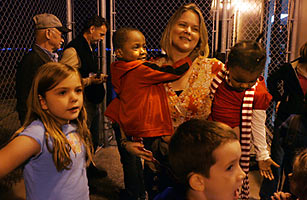
Cara Boone, center, walks away from customs at Florida's St. Lucie County International Airport holding her new adoptive children, Kervens, 4, and Rebecca, 3, who were orphans at Three Angels Children's Orphanage in Pétionville, Haiti
Dressed in an orange floral pinafore with her hair neatly pulled back into cornrows, 7-year-old Marie Guerline Clerge Bryditzki could serve as the poster child for increased efforts to place Haiti's orphans in adoptive homes following the devastating earthquake.
Although Marie has living biological parents in Haiti, she is going to live with a family in the U.S. that has been trying to adopt her for the past two years, says Dixie Bickel, director of God's Littlest Angels, the agency outside of Pétionville that arranged the adoption. Exactly a week after the Jan. 12 7.0-magnitude quake, the paperwork was in order and Marie was set to fly out of Toussaint Louverture International Airport in Port-au-Prince.
"The only good thing to come out of this [earthquake] is to see babies go home as babies," says Bickel, explaining that before the earthquake, it usually took at least two years for the adoption of Haitian children to go through. "Nine years ago, it only took three months," she says, adding that both Haitian and American bureaucracies are to blame. Where the Canadian embassy can process the necessary visas in three days, it's not unusual for the U.S. embassy in Port-au-Prince to take upwards of six weeks, she says.
In Marie's case, it took only two days. Her temporary guardian — Henry Couser, development director of Operation Mobilization, a Christian relief organization out of Georgia — shepherded her through the process. Adoptive parents Debbie and Steve Bryditzki enlisted Couser's help when they heard he was heading to Haiti to bring relief supplies. The California couple also tapped media mogul Ted Turner to help fly the child out, Couser tells TIME. The airport cleared his plane to land at 4 a.m. on Jan. 20, Couser says.
Marie's biological parents said goodbye to their youngest child on Jan. 18. "It's a very unusual situation, where she is not an 'orphan' orphan," Couser says. "There was an awful lot of tears yesterday from Mama and Papa. Her parents gave her up because they want her to have a better life." She is the youngest of four children, and her unemployed parents couldn't afford to take care of her, he says. Bickel further explains that despite how healthy Marie currently looks, she was sickly as a child and required medical attention.
Celianie Valmond, who oversees the orphanage Maison D'Enfant Par La Foi (Children's Home for the Faith), says there are many Haitian children like Marie who are in orphanages because their parents either cannot afford to raise them or have abandoned them — or are dead. Valmond's orphanage, in the Carrefour district of the capital, normally houses 200 orphans. But since the earthquake, whole families are bunking at orphanages rather than going homeless, she says. The number of people seeking shelter at the facilities since the quake has doubled, she says, adding that this is happening throughout the country. At many of the roughly 55 orphanages in Carrefour, people have resorted to sleeping on mattresses outside; there simply is not enough room to house everyone indoors. Some have more dire concerns. The Good Shepherd, another orphanage in Carrefour, has placed all of its orphans outside because the dormitory suffered widespread cracks in its foundation.
There are other looming problems. "We're preparing for 15,000 new orphans in the Carrefour area," says Valmond. Carrefour had a population of more than 400,000 before the quake, and many of those who survived lost one or both parents as well as their homes, she says.
Marie is one of the lucky ones. The original plan was to fly her out on a Gulfstream jet on Jan. 18. Because she didn't have a photograph and the embassy initially wasn't able to transmit one taken there, Couser and his charge had to return the following day. A portly security officer, who previously had worked with Blackwater, arbitrarily blocked a U.S. reporter from entering the embassy to accompany them through the process. Meanwhile, thousands of Haitians waited patiently in the relentless heat, the queue resembling something from the fall of Saigon, when desperate refugees sought to leave Vietnam at the end of the war.
What seemed like a simple process turned into a 2½-hr. ordeal. "Just heard a guy say that they can't print anything right now," Couser texted. "Whole batch of documents waiting to go. Can't believe that for lack of a printer, the whole process has come to a standstill." And then suddenly a breakthrough. Shortly before 2:30 p.m, Linda Percy, who arranges humanitarian visas, provided the necessary documents in an official goldenrod-colored envelope with "EVACUATED ORPHAN" written in block letters on the front. "I wish I could have given this to you last night," Percy told Couser. "But she's ready to go."